November 12, 2025 | 17:48 GMT +7
November 12, 2025 | 17:48 GMT +7
Hotline: 0913.378.918
November 12, 2025 | 17:48 GMT +7
Hotline: 0913.378.918
On the afternoon of July 25, Ministry of Agriculture and Environment (MAE) held a mid-year review conference and firmly committed to implementing tasks for the second half of 2025. Acting Minister of Agriculture and Environment Tran Duc Thang attended and directed the conference.
With the action motto "Discipline and responsibility, proactive and timely, streamlined and effective, fast and breakthrough," the entire agriculture and environment sector entered 2025 with renewed momentum and strong determination. In the first 6 months of the year, the sector recorded positive growth figures, making significant contributions to the national economy and efforts to improve the investment and business environment.
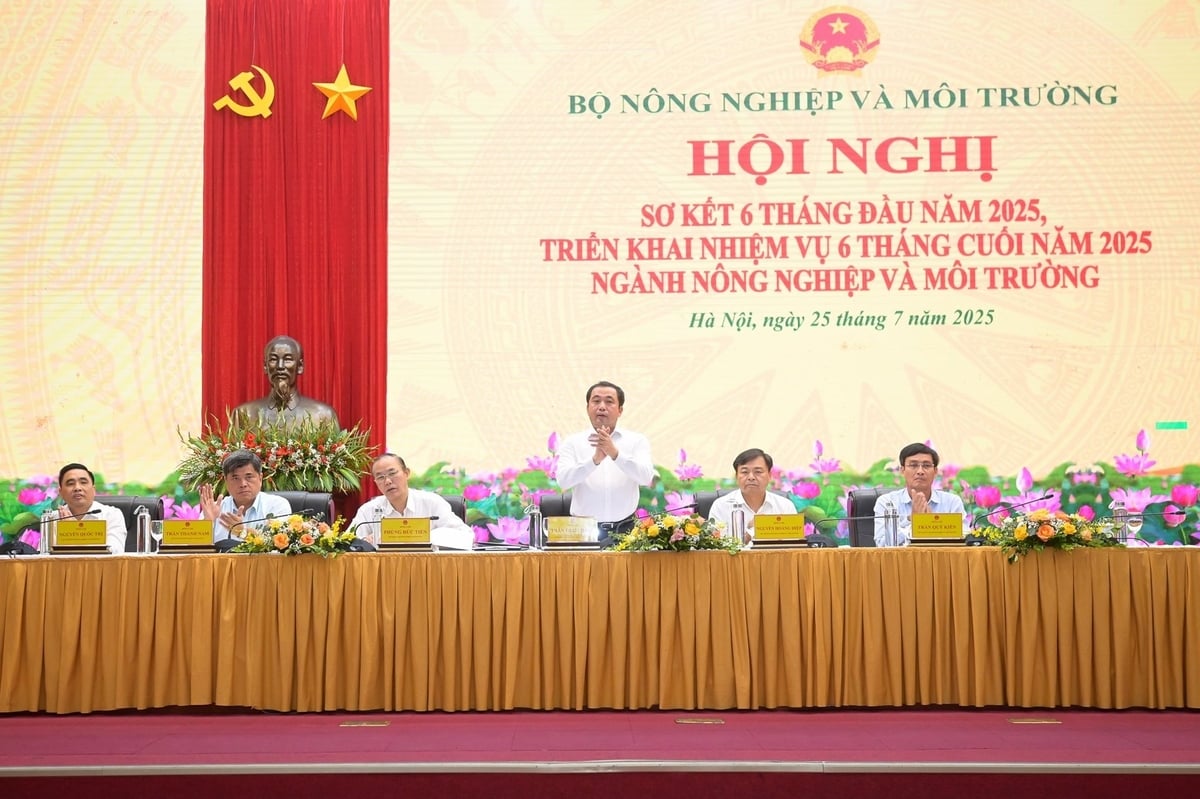
Ministry of Agriculture and Environment held a mid-year review conference to implement tasks for the second half of 2025. Photo: Tung Dinh.
According to the report, the value-added growth rate of the agro-forestry-fishery sector reached 3.84% compared to the same period in 2024. Of this, agriculture grew by 3.51%; forestry by 7.42%; and fisheries by 4.21%. This is the second-highest growth rate in the 2021 - 2025 period, basically meeting the growth target for the first half of the year.
Agro-forestry-fishery export turnover reached USD 33.84 billion, up 15.5% year-on-year; the trade surplus stood at USD 9.83 billion, up 16.3% and higher than the overall trade surplus of the economy (USD 7.63 billion).
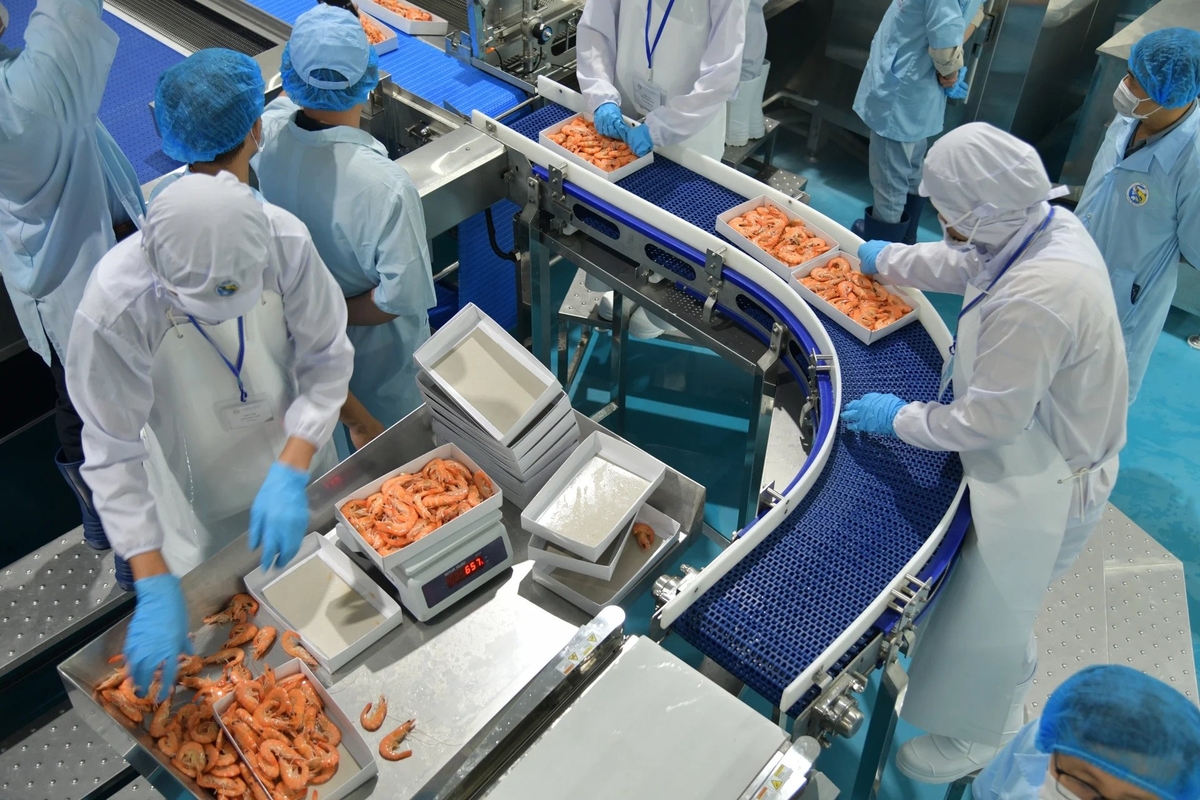
In the first half of 2025, Vietnam’s agro-forestry-fishery trade surplus reached nearly USD 10 billion, setting a record and surpassing expectations.
Reporting at the conference, Deputy Minister Phung Duc Tien stated that right from the beginning of the year, MAE promptly implemented directives and guidance from the Government and the Prime Minister. MAE’s action program focused on synchronously carrying out tasks and solutions across all areas, from stabilizing the organizational structure after restructuring to proactively responding with policies to domestic and global fluctuations.
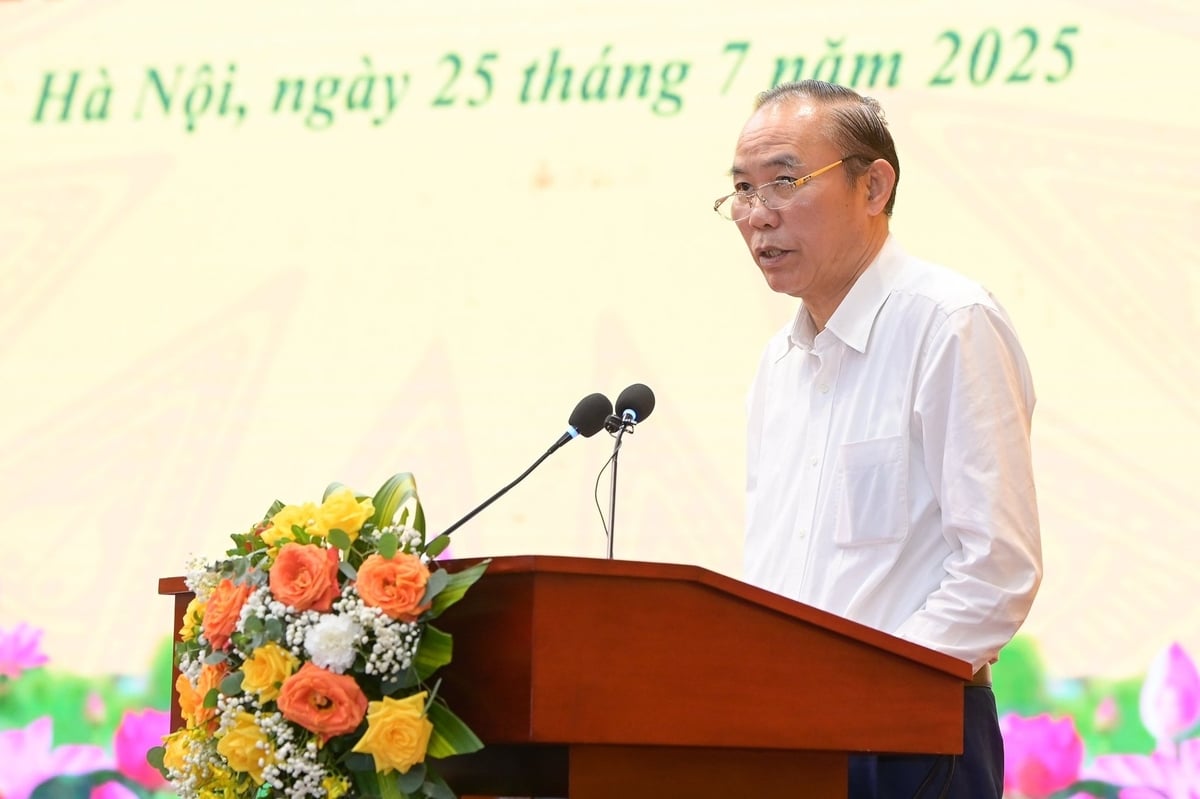
Deputy Minister Phung Duc Tien reported that in the first half of 2025, agro-forestry-fishery exports reached USD 33.84 billion, up 15.5%. Photo: Tung Dinh.
Preparations for the upcoming National Assembly session were thoroughly carried out. Expanding export markets and maintaining the strengths of agro-forestry-fishery products in traditional markets remained a central focus of management and direction.
Regarding institutional and policy reform, MAE has delegated 489 out of 630 administrative procedures to local authorities, equivalent to 77.62%. A total of 277 out of 846 business investment conditions (32.74%) have been proposed for removal; 5,735 out of 16,667 days (34.41%) of administrative processing time have been proposed for reduction; and compliance costs have been proposed to be cut by VND 5,086 out of 9,702 billion (52.42%).
MAE has also actively engaged in international integration and effectively participated in global cooperation mechanisms, implementing the Politburo’s Resolution No. 57-NQ/TW on breakthroughs in science, technology, innovation, and national digital transformation.
The agro-forestry-fishery production sectors developed steadily, ensuring food security, meeting domestic consumption, and supporting exports. Environmental protection and climate change response were implemented comprehensively. Strong measures were taken to protect water and air quality, manage household waste, and control pollution risks. The capacity for forecasting and issuing early warnings for extreme weather events continued to improve, ensuring the safety of dikes and enhancing disaster prevention and control efforts.
Deputy Minister Phung Duc Tien noted that in the second half of the year, the entire sector would continue to vigorously implement resolutions, laws, strategies, master plans, and action programs, focusing on sustainable, efficient, transparent, and multi-value integrated agricultural development.
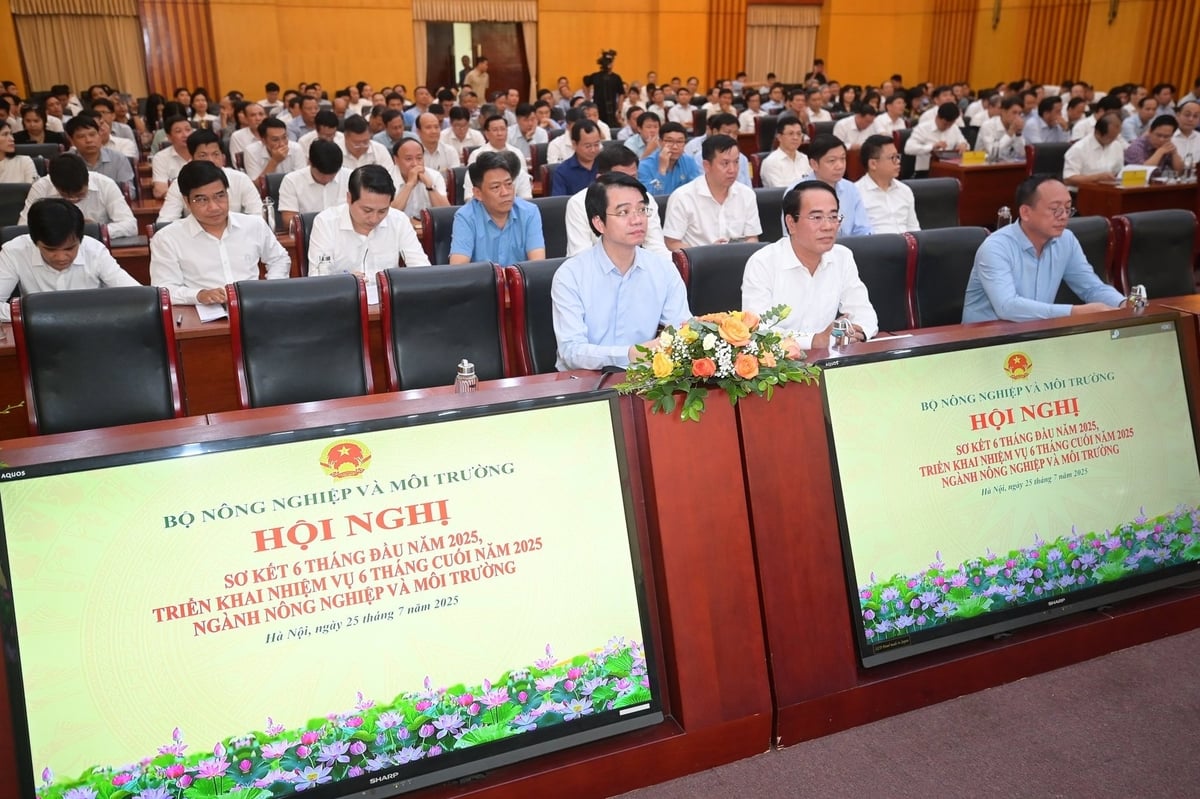
Delegates attended the mid-year review conference. Photo: Tung Dinh.
One key priority is organizing the 1st Party Congress of the Ministry of Agriculture and Environment for the 2025 - 2030 term. In parallel, MAE will amend and supplement the Land Law following the issuance of a new resolution by the Central Committee; draft a Government resolution to remove obstacles in implementing the Law on Geology and Minerals; and develop a draft law amending several existing laws in the fields of agriculture and environment to implement the two-tier local government model.
MAE is also focusing on finalizing the national land use planning and will submit to the National Assembly at the October 2025 session the investment policy for the National Target Program on New Rural Development for the 2026 - 2030 period.
At the same time, working delegations will continue to be organized to promptly resolve local difficulties in implementing the two-tier local government model. The review of resources and restructuring of agricultural sectors will be aligned with new spatial development orientations.
The entire sector is committed to fulfilling the 2025 growth targets and agro-forestry-fishery import-export turnover goals. Key efforts will focus on agricultural restructuring in connection with a shift in growth models, developing high-quality and specialty rice, and promoting value chain linkages.
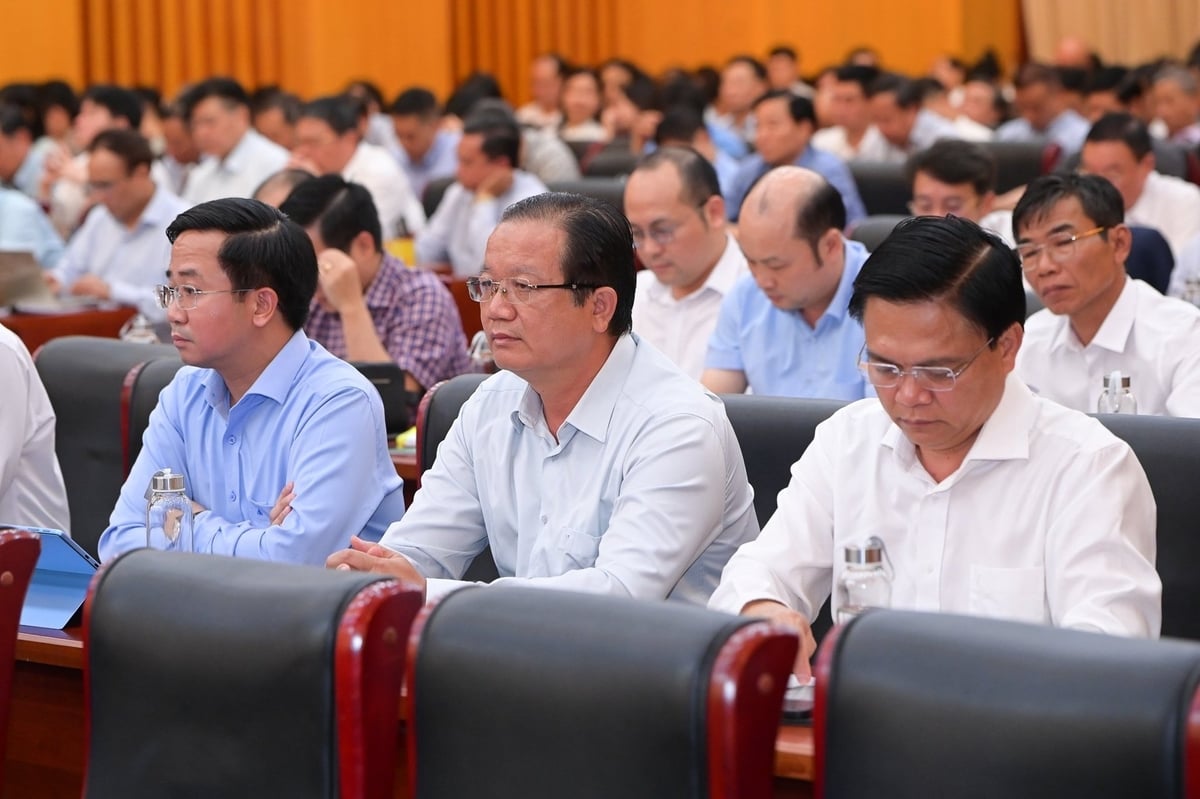
Local leaders attended the conference. Photo: Khuong Trung.
Trade promotion efforts continue to be strengthened, targeting expanding markets such as Halal, the Middle East, and the Americas. At the same time, support is being provided to help localities connect agricultural products to modern distribution channels and e-commerce platforms during harvest seasons.
MAE is also closely monitoring developments related to the U.S. imposition of a reciprocal tariff on Vietnamese goods and is developing flexible response scenarios and solutions.
Based on first-half results, MAE is updating its growth scenarios for the third and fourth quarters, as well as for the entire second half of the year, proposing breakthrough, feasible, and effective solutions. Preparations are also underway for the growth scenario for the 2026 - 2030 period.
The sector has identified public investment disbursement as a key indicator in evaluating task performance. Therefore, MAE will study the allocation of monthly and quarterly disbursement targets to each investor, ensuring legal compliance, efficiency, and quality.
In particular, the sector will continue effectively implementing Politburo's four pillar resolutions (Nos. 57, 59, 66, and 68), focusing on removing institutional barriers and promoting digital transformation in agricultural and environmental management. Vocational training for farmers will be prioritized based on the needs of the market and businesses.
MAE also aims to build a digital government and digital agriculture, digitize environmental and natural resource data, and develop large data platforms such as geographic, land, and remote sensing maps laying the foundation for a digital economy in the agriculture and environment sector.
The sector is committed to fully implementing all groups of state management tasks as outlined in its programs and plans, continuing to maintain its role as one of the pillars of the national economy and a key force in sustainable development.
Translated by Kieu Chi

(VAN) FAO Representative in Viet Nam stated that the country not only ensures domestic food security but also helps shape a sustainable global food system.

(VAN) Vietnam’s environmental sector affirms its pioneering role in protecting natural resources, maintaining ecological balance, and advancing sustainable, green, and harmonious national development.

(VAN) From straw, coffee husks, to sugarcane bagasse, agricultural by-products are being transformed into new resources for a lower-emission future in crop production.

(VAN) The application of remote sensing technology and AI is becoming a strategic tool helping Viet Nam modernize agriculture management and implement smart environmental governance.

(VAN) From the early days, international cooperation has helped Vietnam’s agriculture sector broaden its vision, access knowledge, and achieve significant progress in development and poverty reduction.

(VAN) Over the past 80 years of formation and development, Quang Ninh has affirmed its pioneering position in resource management and environmental protection.

(VAN) Amid many hardships in distant Cuba, Vietnamese experts quietly sow seeds of knowledge every day, reviving once-barren rice fields.